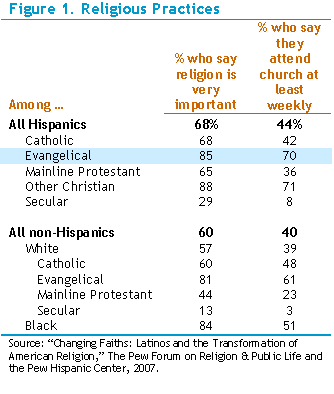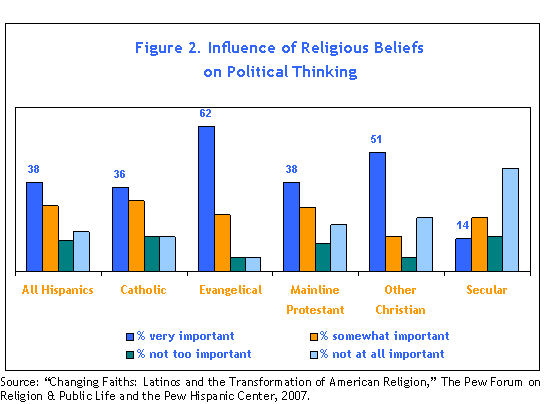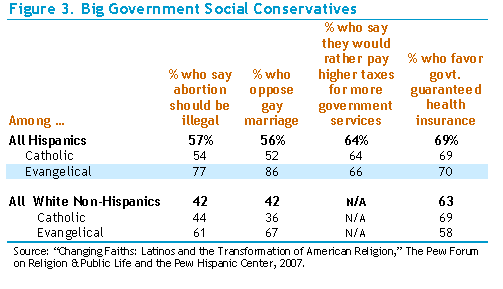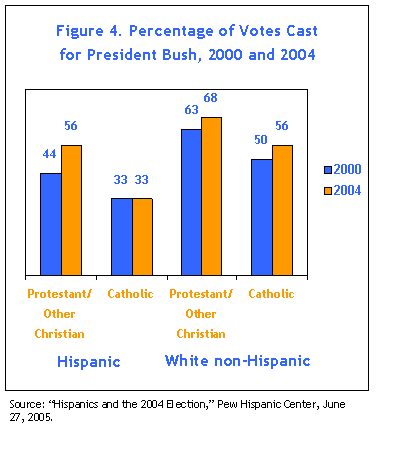June 6, 2007
by Luis Lugo, Director, and Allison Pond, Research Assistant
Next week hundreds of evangelical Latino pastors and church leaders will descend on Washington, D.C., for the annual National Hispanic Prayer Breakfast. Over the years, the event has steadily grown from a simple banquet to a three-day affair, running Wednesday through Friday. It includes not only the prayer breakfast but also lobbying visits to Capitol Hill, a women’s leadership dinner focusing on health issues and the release of a major study on housing issues facing the Hispanic community.
As in the past, the event will attract high-level political leaders from both parties, including President Bush, who spoke at the first annual prayer breakfast in 2002 and has appeared every year since. An array of presidential candidates, including Hillary Clinton, Rudolph Giuliani, John McCain, Barack Obama and Bill Richardson also have been invited to speak at this year’s event.
The prayer breakfast offers a vivid illustration of the growing presence and increasing political influence of Latino evangelicals, who now make up some 15% of the rapidly expanding Hispanic population in the U.S., according to a recent survey by the Pew Forum on Religion & Public Life and the Pew Hispanic Center. That survey also shows that among eligible Latino voters, evangelicals are twice as likely as Latino Catholics to identify with the Republican Party (37% vs. 17%). Latino evangelicals also are far more likely than Latino Catholics to describe themselves as conservative (46% vs. 31%).
In short, if Republicans have a prayer in making deep inroads into the Hispanic community, evangelicals may well provide their most direct route.
Religious Profile
As mentioned, nearly one-in-six U.S. Hispanics (15%) identify themselves as evangelicals, making them the second largest religious group in the Latino community. Other Protestants, including mainline Protestants (5%) and members of other groups such as Jehovah’s Witnesses, account for another 8%. Most Hispanics (68%) are Roman Catholics, while seculars account for 8% of the total. Members of other faiths barely make up 1% of the Latino community.
The recently released Pew survey found that roughly half (51%) of Latino evangelicals are converts, mostly from Catholicism, and that more than two thirds (69%) identify with pentecostal and charismatic forms of Christianity. Although most (55%) Hispanic evangelicals are first-generation Americans, that percentage is lower than it is for Latino Catholics, more than two-thirds (68%) of whom are foreign born. This trend is reflected in the fact that nearly two-thirds of Latino evangelicals (63%) say English is their primary language or that they are bilingual, compared with less than half (45%) of Latino Catholics. Evangelicals also have slightly higher levels of education and income than the Latino population as a whole.

Latinos, who now comprise about 6% of the overall evangelical Protestant population in the U.S., are similar in many ways to their white evangelical counterparts when it comes to religious beliefs and practices. This is clearly the case with respect to the strong importance they place on religion (85% say it is very important in their lives) as well as the high proportion who say they pray daily (87%). Perhaps reflecting the zeal of recent converts, Latino evangelicals are somewhat more likely to say they attend church weekly than white evangelicals (70% compared to 61%) and to view the Bible as the literal word of God (76% compared to 62%).
Religion and Public Life
Latino evangelicals clearly stand out from other Hispanics when it comes to politics, and not just for their more Republican and conservative orientation. Latino evangelicals also show little reluctance when it comes to mixing faith and politics. For instance, they are far more likely than Hispanics generally (62% vs. 38%) to say that religion is very important in influencing their political thinking; an additional 24% say it is somewhat important. Moreover, by a solid majority (65%) they believe that churches should express their views on social and political questions, and by nearly as large a number (60%) they say that there has been too little religious expression by political leaders.

Latino evangelicals also take more conservative positions on many social issues compared with Latino Catholics and even compared with other evangelicals. For example, an overwhelming majority (86%) oppose gay marriage, compared with 52% among Latino Catholics and 79% among white evangelicals. A large majority (77%) also say that abortion should be illegal, compared with 54% and 61%, respectively, for Latino Catholics and white evangelicals.
On foreign policy issues, too, Latino evangelicals track fairly closely with the conservatism of their white evangelical counterparts. For instance, although their support for the Iraq war is not as high as among white evangelicals (49% vs. 60%, at the time the survey was conducted), they are significantly more likely than Latinos as whole (31%) to say that the use of force in Iraq was the right choice. The similarity is even more pronounced when it comes to the issue of Israel and the Palestinians, where the sympathy of a solid majority of Latino evangelicals (62%) is clearly with Israel. That level of sympathy is much higher than among Hispanics generally (33%) and rivals the level of support among non-Hispanic evangelicals (59%).
But Latino evangelicals differ from white evangelicals, and more closely resemble Latino Catholics, on other policy issues. For instance, nearly half (47%) oppose the death penalty, compared with just 16% of white evangelicals. A similar, and more predictable, departure from white evangelical attitudes is evident on the issue of immigration. While only a minority (33%) of non-Hispanic evangelicals say that immigrants strengthen American customs and values, a solid majority (59%) of Latino evangelicals hold that view. (The comparable figure among Latino Catholics is even higher at 67%.)

Latino evangelicals, along with other Latinos, also hold generally liberal views on economic issues and are more likely to support government programs and sympathize with poor people than are white evangelicals. For example, a large majority of Latino evangelicals favor government-guaranteed health insurance (70% vs. 58% of white evangelicals), and 57% (vs. 42% of white evangelicals) say poor people have hard lives due to lack of government services. Fully 66% of Latino evangelicals say they would rather pay higher taxes for more government services. In sum, Latinos in general, including evangelicals, tend to be big government social conservatives.
Recent Voting Patterns
The strong Republican orientation of Latino evangelicals compared with other Latinos was clearly evident in the 2004 presidential election. In that race, according to an analysis of state exit polls conducted by the Pew Hispanic Center, President Bush received 40% of the overall Latino vote, up from 34% in 2000.
That same analysis shows that Latino Protestants, the great majority of whom are evangelicals, accounted almost entirely for this increase. (The percentage of the Hispanic Catholic vote remained unchanged at 33%.) And not only did Latino Protestants vote more heavily Republican in 2004, they also represented a higher percentage of the Latino electorate than in 2000 (32% vs. 25%).

National exit poll numbers from 2006 suggest that Hispanics, along with the electorate as a whole, shifted away from the Republicans, giving only 30% of their vote to GOP candidates in the U.S. House of Representatives races. An analysis by the Pew Hispanic Center of U.S. Senate and state gubernatorial races around the country reveal a similar split in partisan preference. This represents a 10-point swing away from Republicans compared with 2004 and a seven-point swing compared with the midterm elections of 2002.
But the results were not entirely bleak for the Republicans. As the Pew Hispanic Center report points out, some Republican candidates in states with sizable Hispanic electorates, such as California, Texas and Arizona, did much better than their party’s showing at the national level, and, in fact, received a share of the Latino vote that was comparable to the portion of the vote Bush received in 2004.
Bush-Cheney ’04 campaign manager Ken Mehlman called the Latino vote “the single most important number” that came out of the 2004 election. More recently, in a piece posted on The Politico, Mehlman stated: “The majority party in the 21st century will be the party that reaches out to Hispanics.” If that truly is the case, then the growing Latino evangelical community will have a significant say in the future direction of American politics.


